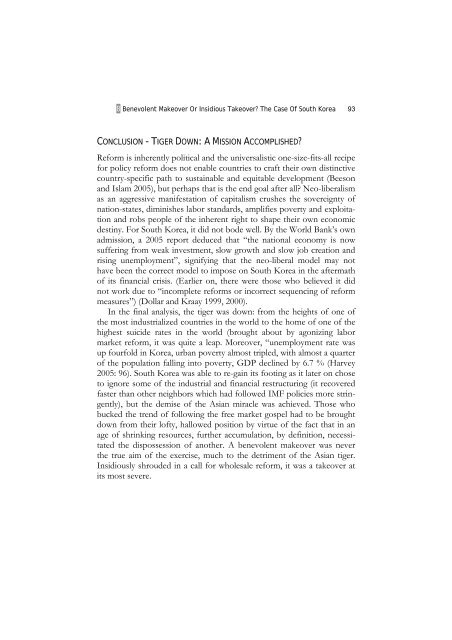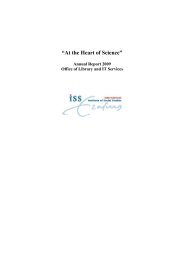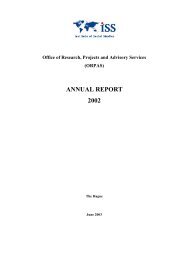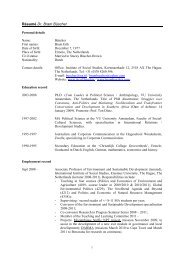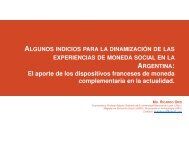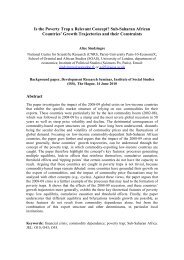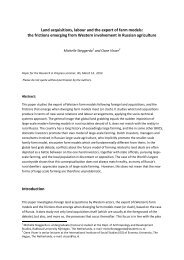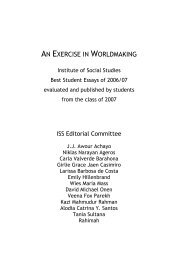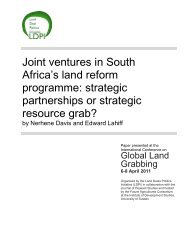AN EXERCISE IN WORLDMAKING 2009 - ISS
AN EXERCISE IN WORLDMAKING 2009 - ISS
AN EXERCISE IN WORLDMAKING 2009 - ISS
You also want an ePaper? Increase the reach of your titles
YUMPU automatically turns print PDFs into web optimized ePapers that Google loves.
8 Benevolent Makeover Or Insidious Takeover? The Case Of South Korea 93<br />
CONCLUSION - TIGER DOWN: A M<strong>ISS</strong>ION ACCOMPLISHED?<br />
Reform is inherently political and the universalistic one-size-fits-all recipe<br />
for policy reform does not enable countries to craft their own distinctive<br />
country-specific path to sustainable and equitable development (Beeson<br />
and Islam 2005), but perhaps that is the end goal after all? Neo-liberalism<br />
as an aggressive manifestation of capitalism crushes the sovereignty of<br />
nation-states, diminishes labor standards, amplifies poverty and exploitation<br />
and robs people of the inherent right to shape their own economic<br />
destiny. For South Korea, it did not bode well. By the World Bank’s own<br />
admission, a 2005 report deduced that “the national economy is now<br />
suffering from weak investment, slow growth and slow job creation and<br />
rising unemployment”, signifying that the neo-liberal model may not<br />
have been the correct model to impose on South Korea in the aftermath<br />
of its financial crisis. (Earlier on, there were those who believed it did<br />
not work due to “incomplete reforms or incorrect sequencing of reform<br />
measures”) (Dollar and Kraay 1999, 2000).<br />
In the final analysis, the tiger was down: from the heights of one of<br />
the most industrialized countries in the world to the home of one of the<br />
highest suicide rates in the world (brought about by agonizing labor<br />
market reform, it was quite a leap. Moreover, “unemployment rate was<br />
up fourfold in Korea, urban poverty almost tripled, with almost a quarter<br />
of the population falling into poverty, GDP declined by 6.7 % (Harvey<br />
2005: 96). South Korea was able to re-gain its footing as it later on chose<br />
to ignore some of the industrial and financial restructuring (it recovered<br />
faster than other neighbors which had followed IMF policies more stringently),<br />
but the demise of the Asian miracle was achieved. Those who<br />
bucked the trend of following the free market gospel had to be brought<br />
down from their lofty, hallowed position by virtue of the fact that in an<br />
age of shrinking resources, further accumulation, by definition, necessitated<br />
the dispossession of another. A benevolent makeover was never<br />
the true aim of the exercise, much to the detriment of the Asian tiger.<br />
Insidiously shrouded in a call for wholesale reform, it was a takeover at<br />
its most severe.


